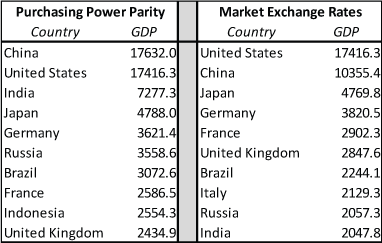Personal Wealth Management / Economics
No, China Is Not Number One.
What to make of recent IMF estimates that show, by one measure, China's economy will be larger than America's this year.
Who's number one? Photo by Wesley Hitt/Getty Images.
Here is a newsflash that some in the media latched onto Thursday, churning out headline after headline:
According to the International Monetary Fund (IMF), this year China's economy will be bigger than the US's, $17.6 trillion to $17.4 trillion.
And it's true! But that factoid comes with a major asterisk, one rendering it twisted trivia. Oh and for investors, this is beyond meaningless. Let us explain.
Every six years the fun bunch over at the World Bank's International Comparison Project takes a country-by-country look at world GDP adjusted using a statistical method called purchasing power parity (PPP).[i] PPP is an attempt to equalize measures of economic output for price differences-to use the IMF's example, "If a hamburger is selling in London for £2 and in New York for $4, this would imply a PPP exchange rate of 1 pound to 2 US dollars." It is a means of converting GDP from national currency to US dollars, without regard to market-based currency exchange rates. So the same good in Beijing is valued the same as one in San Francisco. This, of course, cannot account for quality-which price differences may-or the fact two goods may not be comparable. A haircut in Lima, Peru is comparable to one in New York. (Fancy stylist aside.) However, this just isn't true across the board. Supply and demand factors do differ.
Based on market-exchange rates, which use actual exchange rates and not these smoothed-over factors, China is still quite a distance smaller than the US. Many economists, including those at the IMF believe GDP measured at PPP rates is a less appropriate tool to tally an economy's weight in the global economy.
Exhibit 1: Estimated 2014 GDP at PPP Rates Versus GDP at Market Exchange Rates (Billions of USD)
Source: IMF, World Economic Outlook Database, all figures 2014 estimates as of 12/04/2014.
You can make of this what you like; which of these indexes you prefer is your choice. But let's be clear: This is the squarely in the realm of academia-a fine realm, but far removed from the realm of investing. The IMF's GDP at PPP is produced at a significant lag, and only once every six years. The figures for 2014 are (considering the date) estimated. Even quarterly GDP reports released the month after calendar quarter-ends are old data. The activity happened. Stocks are forward-looking. Such old data aren't of that much use.
But it's actually even a little more meaningless than that for assessing stocks. Stocks wouldn't care one iota whether the US is ranked first, fifth or 23rd by a quirky calculation of a somewhat quirky government statistic. Stocks do just fine in nations that rank far further down the list by GDP measured at PPP. It isn't as though China is growing and the US shrinking. Both economies are on the rise, just at differing rates. The whole notion seemingly operates on the presumption that being first means you're winning, when in reality, the global economy isn't zero sum. One nation growing relatively faster doesn't mean another is losing. In fact, the former's fast growth may be a big benefit to the latter.
GDP won't tell you where stocks are heading. Nor will aggregate GDP show which country is actually richer, either, in the sense a total figure doesn't account for population differences. Someday, China's economy may actually be larger than the US's, by whatever measure you choose. But heck, they have 1.3 billion people. China's per-capita GDP is a bit less than $13,000 annually[ii], good enough to tally #86 in the world, bracketed by Macedonia and the Dominican Republic, which are not known to be an economic or geopolitical juggernauts.[iii] The US is 11th, at just under $55,000.
None of this is to say China's economic growth hasn't been impressive, even historic. It has been. It is not to say China's clout hasn't increased with this rise. But whether China is #1 or #2 in total output by one wonky measure isn't really all that relevant. It is not, as one writer hyperbolically put it, "a geopolitical earthquake with a high reading on the Richter scale." In fact, it wouldn't mean all that much even if it were #1 by a less wonky measure. If China's economy grows, the world economy is better off for it, overall and on average. GDP, no matter how it's measured, simply doesn't equal world domination.
Stock Market Outlook
Like what you read? Interested in market analysis for your portfolio? Why not download our in-depth analysis of current investing conditions and our forecast for the period ahead. Our latest report looks at key stock market drivers including market, political, and economic factors. Click Here for More!
[i] So the initial report was published by the World Bank in April. The full release hit more recently, triggering this latest round of headlines. But the China-is-bigger story is actually eight months old.
[ii] Heck, even this doesn't tell you all that much. We're fairly certain the many millions of Chinese farmers living hand-to-mouth don't feel like $13,000 per-capita GDP.
[iii] Source: IMF. World Economic Outlook Database. Estimated 2014 GDP per capita at PPP.
If you would like to contact the editors responsible for this article, please message MarketMinder directly.
*The content contained in this article represents only the opinions and viewpoints of the Fisher Investments editorial staff.
Get a weekly roundup of our market insights
Sign up for our weekly e-mail newsletter.

See Our Investment Guides
The world of investing can seem like a giant maze. Fisher Investments has developed several informational and educational guides tackling a variety of investing topics.







